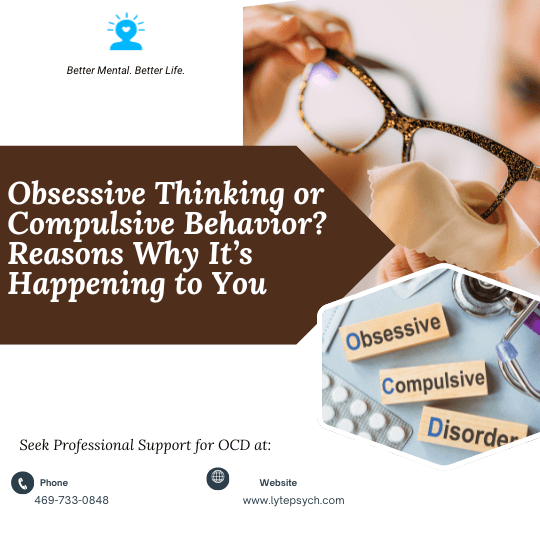Tue Apr 29 2025
Obsessive Thinking or Compulsive Behavior? Reasons Why It’s Happening to You at Lyte Psychiatry, Best Psychiatrist in Arlington, Dallas, TX (Affordable Therapist and Psychiatrist Near You) Best Adults and Adolescents Therapist and Psychiatrist Near You

Obsessive Thinking or Compulsive Behavior? Reasons Why It’s Happening to You — Find Help at Lyte Psychiatry, Arlington & Dallas’ Top Mental Health Clinic
Have you ever found yourself stuck in a loop of unwanted thoughts or repetitive behaviors that feel impossible to control? Whether it's obsessively worrying or needing to check things over and over again, you're not alone — and more importantly, you're not without help.
At Lyte Psychiatry, located conveniently in Arlington and Dallas, TX, we specialize in helping adults and adolescents understand and manage Obsessive-Compulsive Disorder (OCD) and related conditions.
🧠 What Is Obsessive Thinking?
Common examples include:
✅ Fear of contamination or germs
✅ Worries about harming someone unintentionally
✅ Intrusive sexual or violent thoughts
🔁 What Is Compulsive Behavior?
Typical compulsions include:
✅ Repeated checking (locks, stoves, etc.)
✅ Arranging items “just right”
✅ Mental compulsions like counting or silent praying
❓Why Does This Happen to You?
The exact cause of OCD isn’t fully understood, but experts point to a combination of:
🔷 Genetics: Family history increases your risk
🔷 Brain structure and function: Differences in the brain's communication systems
🔷 Environmental stressors: Trauma, abuse, or significant life changes
🔷 Neurochemical imbalances: Especially involving serotonin
Seek Professional Help Near You at Lyte Psychiatry (Affordable Therapist and Psychiatrist Near You) Located in Dallas & Arlington, TX
If you're feeling overwhelmed by obsessive thoughts or compulsive behaviors, don't suffer in silence. At Lyte Psychiatry, our compassionate team of psychiatrists and therapists works with both adults and adolescents, offering affordable, personalized care that gets results.
We use evidence-based treatments like:
✅ Cognitive Behavioral Therapy (CBT)
✅ Exposure and Response Prevention (ERP)
✅ Medication management (when appropriate)
👉 Schedule your confidential consultation today: 📍 Visit www.lytepsychiatry.com to book your appointment
To see our services. Click Here
Call us if you have questions at 469-733-0848
Frequently Asked Questions:
Q: How do I know if I have OCD or just anxiety?
A: OCD is marked by specific obsessions and compulsions that interfere with daily life. While anxiety can involve excessive worry, it doesn't typically include repetitive rituals or intrusive thoughts to the same degree.
Q: Can OCD go away on its own?
A: OCD tends to be chronic if untreated, but early intervention can significantly improve outcomes. Therapy and/or medication can help manage symptoms effectively.
Q: What’s the best therapy for OCD?
A: ERP (Exposure and Response Prevention) is considered the gold standard. It helps individuals confront their fears and reduce compulsive behaviors.
Q: Is OCD treatable in teens?
A: Yes! Adolescent-focused treatment at Lyte Psychiatry addresses OCD in younger patients with age-appropriate techniques.
Q: How quickly can I get help at Lyte Psychiatry?
A: We offer flexible scheduling, including evenings and weekends. Many clients are seen within a week of contacting us.